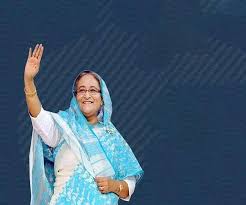Bangladesh’s Prime Minister Sheikh Hasina and her sister, Sheikh Rehana, were moved to a “safe shelter” from her official residence in Dhaka due to escalating violence. Amidst widespread protests and unrest, Hasina resigned and landed at the Hindon Indian Air Force base near Delhi around 6 pm on Monday. In a televised address, Army Chief General Waker-uz-Zaman announced that the military would form an interim government and investigate the deaths of at least 300 people killed during the protests.
Protesters, defying a nationwide curfew, called for a “Long March to Dhaka,” demanding Hasina’s resignation. The Prime Minister accused the demonstrators of “sabotage” and shut down mobile internet services to control the situation. In response, the military imposed a new indefinite curfew to curb further violence.
India’s Border Security Force is on high alert along the Bangladesh border. The Ministry of External Affairs advised against traveling to Bangladesh and urged those already there to exercise extreme caution, restrict their movements, and stay in contact with the High Commission in Dhaka.
The protests began with students demanding the end of a quota system that reserved 30% of government jobs for families of veterans from Bangladesh’s independence war. Despite the Supreme Court reducing the quota to 5%, the protests continued, demanding accountability for the violence and Hasina’s resignation. The government blamed opposition parties, particularly the Bangladesh Nationalist Party and the now-banned Jamaat-e-Islami, for instigating the violence, which included attacks on state-owned properties.
Student leaders rejected Hasina’s invitation for dialogue, calling for a nationwide civil disobedience campaign. Tensions heightened as student leaders led sieges on major streets in Dhaka, resulting in further clashes and deaths. Over 200 people died and thousands were injured before the violence on Sunday, when police fired tear gas and rubber bullets as protesters set cars and buildings ablaze.
Hasina, Bangladesh’s longest-serving leader, has faced increasing criticism for her alleged autocratic rule. The recent protests are the most significant challenge to her tenure, with accusations of vote-rigging, opposition arrests, and press suppression. International observers, including the U.N., have called for an end to the violence, urging all sides to find a peaceful resolution.
Following her resignation, there were celebrations on the streets. Protesters, seeing this as a victory for their cause, expressed hopes for reform and an end to autocratic leadership in Bangladesh. People gathered on the streets, some offering flowers to soldiers who opened the roads. There was a sense of triumph among the protesters, with many expressing optimism about the future and the potential for significant reforms in the country’s governance.
The resignation of Sheikh Hasina marks a significant turning point in Bangladesh’s political landscape. As the military steps in to form an interim government, the country faces a crucial period of transition. The international community watches closely, hoping for stability and a peaceful resolution to the unrest that has claimed so many lives. The protesters’ determination and the public’s response indicate a strong desire for democratic reforms and accountability in Bangladesh’s governance.















